

Decision-making in realtime. How do we make effective decisions quickly enough to keep up with a large number of simultaneous problems in the same system?
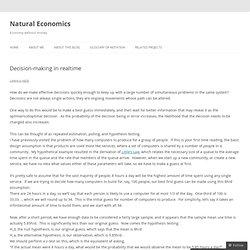
Decisions are not always single actions, they are ongoing movements whose path can be altered. One way to do this would be to make a best guess immediately, and then wait for better information that may reveal it as the optimal/suboptimal decision. As the probability of the decision being in error increases, the likelihood that the decision needs to be changed also increases. This can be thought of as repeated estimation, polling, and hypothesis testing.I have previously visited the problem of how many computers to produce for a group of people. If this is your first time reading, the basic design assumption is that products are used more like services, where a set of computers is shared by a number of people in a community. Now we have an additional problem: What do we do with these extra computers that we have on hand?
Like this: Like Loading... Gratis versus libre. An advertising mascot dressed as a mug of beer, holding a sign saying "Piwo gratis" (Polish for "free beer") in the centre of Kraków, Poland advertising beer being given away without cost.
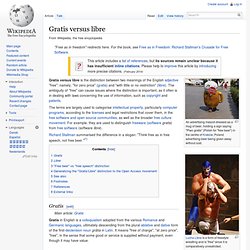
Lucha Libre is a form of freestyle wrestling and is "free" since it is comparatively unrestricted. Gratis versus libre is the distinction between two meanings of the English adjective "free"; namely, "for zero price" (gratis) and "with little or no restriction" (libre). The ambiguity of "free" can cause issues where the distinction is important, as it often is in dealing with laws concerning the use of information, such as copyright and patents. The terms are largely used to categorise intellectual property, particularly computer programs, according to the licenses and legal restrictions that cover them, in the free software and open source communities, as well as the broader free culture movement. For example, they are used to distinguish freeware (software gratis) from free software (software libre). The Dunbar Number, From the Guru of Social Networks.
A little more than 10 years ago, the evolutionary psychologist Robin Dunbar began a study of the Christmas-card-sending habits of the English.
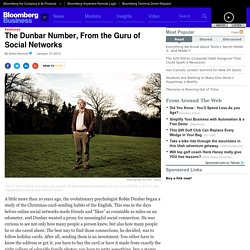
This was in the days before online social networks made friends and “likes” as countable as miles on an odometer, and Dunbar wanted a proxy for meaningful social connection. He was curious to see not only how many people a person knew, but also how many people he or she cared about. The best way to find those connections, he decided, was to follow holiday cards.
After all, sending them is an investment: You either have to know the address or get it; you have to buy the card or have it made from exactly the right collage of adorable family photos; you have to write something, buy a stamp, and put the envelope in the mail. These are not huge costs, but most people won’t incur them for just anybody. Working with the anthropologist Russell Hill, Dunbar pieced together the average English household’s network of yuletide cheer. GA_PRBSCEganWheel.gif (GIF Image, 1120 × 1108 pixels) - Scaled (59%) How Money Makes People Act Less Human. In a windowless room on the University of California, Berkeley, campus, two undergrads are playing a Monopoly game that one of them has no chance of winning.
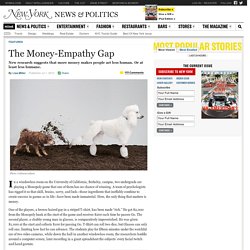
A team of psychologists has rigged it so that skill, brains, savvy, and luck—those ingredients that ineffably combine to create success in games as in life—have been made immaterial. Here, the only thing that matters is money. One of the players, a brown-haired guy in a striped T-shirt, has been made “rich.” He got $2,000 from the Monopoly bank at the start of the game and receives $200 each time he passes Go.
The second player, a chubby young man in glasses, is comparatively impoverished. T-Shirt isn’t just winning; he’s crushing Glasses. For a long time, primatologists have known that chimpanzees will act out social dominance with a special ferociousness, slapping hands, stamping feet, or “charging back and forth and dragging huge branches,” as Jane Goodall once wrote. Reinventing Community Networks as Economic Development Solutions by Frank Odasz. Commonopoly: Redesigning Monopoly for the Sharing Economy.
Cities. Did you know that the average vehicle is parked 90% of the time?
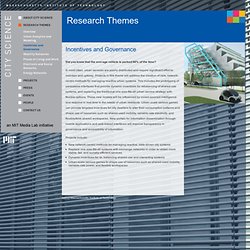
In most cities, urban services are poorly distributed and require significant effort to maintain and upkeep. Projects in this theme will address the creation of new, network-centric methods for managing reactive urban systems. This includes the prototyping of persuasive interfaces that provide dynamic incentives for rebalancing of shared-use systems, and replacing the traditional one-size-fits-all urban service strategy with flexible options. These new models will be influenced by crowd-sourced intelligence and respond in real-time to the needs of urban residents.
Urban-scale serious games can provide targeted incentives for city dwellers to alter their consumption patterns and shape use of resources such as shared-used mobility, variable-rate electricity, and flexible/time-shared workspaces. Projects include: